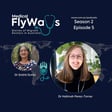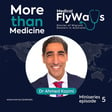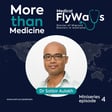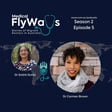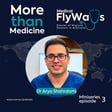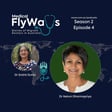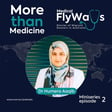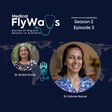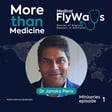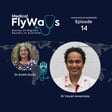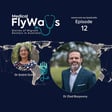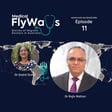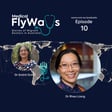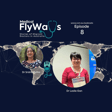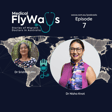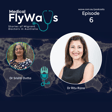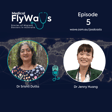Become a Creator today!Start creating today - Share your story with the world!
Start for free
00:00:00
00:00:01

Episode 9 - Dr Ashwita Vanga
On this episode of FlyWays Dr Srishti Dutta speaks to Dr Ashwita Vanga, a trainee obstetrics and gynaecology doctor currently working at Toowoomba Base Hospital in Queensland.
Despite only graduating 2016 from the Lady Hardinge Medical College in India, she has already been involved with a number of advocacy and leadership roles, including being the president of the IMA Dehli student wing and a board member of a not-for-profit organisation.
Recommended
Transcript
Introduction to 'Medical Flyways'
00:00:01
Speaker
Medical Flyways, the untold journeys of migrant doctors in Australia.
Meet Dr. Ashwita Wanga
00:00:13
Speaker
Ashwita, thank you so much for being with me on the podcast today. Dr. Ashwita Wanga is a trainee obstetric and gynecology doctor at Toowoomba Base Hospital in Queensland currently. To give you a little bit more information about her journey, she graduated medicine in 2016 from Lady Hardinge Hospital in New Delhi, which is a premier institute for medical training.
00:00:35
Speaker
in India and has since been involved in advocacy and leadership roles already. ah Quite a range of them including being the president of IMA Delhi Student Wing and a board member for a not-for-profit organization.
00:00:51
Speaker
I heard about her through my brief involvement with the Better Culture Project, which is a more recent project started by RACMA or under the guidance of the Royal Australian College of Medical Administrators. So that's how I found out about you Ashwita and how I've ended up wanting to hear more about your journey.
00:01:14
Speaker
Thank you so much for the generous introduction. I would like to say I'm not a trainee yet and I would like to begin by acknowledging the traditional owners of the land and I pay my respects to the earth's past, present and emerging.
Inspiration & Early Education
00:01:28
Speaker
I would also like to declare that I have no conflicts of interest.
00:01:31
Speaker
It's really an honor and my absolute pleasure. Thank you so much for having me here today. I would probably begin with telling you a bit more about my humble beginnings. My grandfather, it actually comes in very good timing with the Indian Independence Day being just last week. My grandfather was a freedom fighter and I barely knew him. He passed away when I was six years old, but my grandmother tells me that apparently I take after him.
00:02:02
Speaker
So I will take that. So all of this willingness to be a part of the community and just to do something outside of my professional sphere probably comes from that inheritance, which is not very visible, but very valuable.
00:02:18
Speaker
Well, I was born in this small mining town in South India, went to kindy when I was two and a half because my mum said I asked too many questions. So she just sent me to school.
Journey to Medicine
00:02:30
Speaker
ah So like I said, all my achievements are probably the future focused vision of my mother and the genes that I have. There is not much that I have done myself.
00:02:42
Speaker
I went to school and in year 10 decided I have no interest in mathematics whatsoever. I can use a calculator. That's about it. And I just wanted to do biology. At that point in time, the school comes to you before board. This is the time when we used to have board exams. yeah And they would come and ask you what stream you want to do. And I just picked biology, physics, chemistry, excluded mathematics. And I come home and I tell this to my brother. We're only one year apart. And he he's like, do you realize what you have done? I said, well, I have chosen biology. He's like, that means you're going to become a doctor. And I had, honestly, I had no idea. I just used to to read read books from cover to cover.
00:03:25
Speaker
I was a very ignorant, naive nerd and enrolled into these coaching classes where again I read cover to cover and just when year 12 came and they told about MCQs, I i really had not much experience with MCQs so bought another book which just had MCQs and read that cover to cover.
00:03:45
Speaker
I went and did my exams, got the rank and then when we went for the first day at at the university or college, we we used to say college in in Australia, it's called university because ah yeah I think it's very different because the specialist colleges are called colleges.
00:04:04
Speaker
that's right and the physical colleges are called universities yes yes that's right it for us is a group of universities are called colleges and they come under one university it's very interesting common language is hard to achieve yes it's first day of entering med school as they'd call it here and you arrive there and and Wednesday of med school and they're like, welcome future doctors. And I said, what did I get myself into?
Transitioning to Australia
00:04:31
Speaker
And the rest is history. I finished undergrad by the time I was 21. I did not think that was unusual because that was my normal.
00:04:41
Speaker
My dad was working in Australia at the time and he decided we need to move. So after internship I moved here, I had no idea what AMC is, just studied and gave those exams. And like I said, I think I've been very fortunate with my journey. I was at home, I could study from home. I went to Melbourne, did the classes and gave my exams pretty much back to back, finished the whole AMC journey in a year's time.
00:05:05
Speaker
and I was linked in early with the Indian community in Perth, and that is how I networked. and i showed up I showed up to the offices, I said, I'm here, I showed up to the conferences, I said, I'm here, I have AMC, I have English, and this is what I can do, and that is how I landed my first job.
Work Culture: India vs. Australia
00:05:22
Speaker
and Once I started working in Australia, I think <unk> it's a good thing to do AMC too because it gives you the expectation from your colleagues and from the patients.
00:05:34
Speaker
And after that, going to actual clinical field gives you more of an orientation per se. So that helped me. And once I started work, the workload is very differently distributed. You don't have as much as a patient load as much as an administrative load. It was my understanding when I first started. So when I was in ED, I was seeing probably 23 patients in my 10 hour shift.
00:06:03
Speaker
And I was advised by my seniors to probably pace it a bit more, ah which again is is a cultural shock. we We talk about cultural shock, but we don't talk about the administrative side of cultural shock.
00:06:15
Speaker
Yeah, I just wonder, what actually, I wonder whether what you're saying is, and I probably, like you, have worked in both systems or more than one system. And I mean, the rules, do you think that the rules and roles and responsibilities here are different as a junior doctor compared to, say, in India?
00:06:37
Speaker
100%, you're not expected to know everything as long as you're a safe doctor, as long as you don't miss the dangerous things. So that intellectual load is taken off you. So you can give more quality time to the patient rather than just a diagnostic time where you go in with the sole purpose of giving a diagnosis and moving on
Adapting Communication Skills
00:07:00
Speaker
to the next. but Again, it's like it's a system setup. For a higher population, this probably will not work.
00:07:06
Speaker
Absolutely. And for a population like this, where the patient expectation is already set at a certain benchmark, this is what is needed. I cannot go into a room and tell someone, you have a heart attack, this is what we're going to do. Yeah, it's interesting you say that. I remembered one of the medical education sessions in Brisbane, Dr. Graham Emblin, who's a senior medical educator, explained it interestingly.
00:07:34
Speaker
He said, if the patient to doctor ratio is 2000 is to one, you can't do relational medicine. But if the patient to doctor ratio is 23 or 20 is to one, as your experience in ED, you're actually expected to deliver good quality relational medicine, not transactional medicine. How have you adjusted to that change in expectations? What did you have to do differently?
00:07:57
Speaker
I had to unlearn a lot. At number one, because you can't fill in a full cup. So I had to unlearn a lot of behaviors. I had to unlearn a lot of mannerisms. I had to unlearn body language. I had to unlearn my English. Can you give me an example? Because that last one is fascinating more than the others for me. So what did you have to unlearn in terms of language or learn?
00:08:25
Speaker
When I talk to patients, I cannot use jargon. So in India, if I did not use jargon, I'm a dumb doctor. OK, yes. but And if I'm doing a presentation in the department, I should not be using simple language. I should use technical language. Yeah, technical. Correct. Technical language or as complex a PowerPoint as I can. Maybe it'll even put the HOD to sleep. But here it's everything needs to be simplified. Communication needs to flow in a simple manner that a layperson can understand, even if it is your colleague. Again, like I said, that takes away the expectation from anyone. So if i even if I'm doing a handover to a surgeon about a gynecological case, I should not complicate it with technical terms. As much as possible, of course, within reasonable limit, I should not expect the surgeon to know exactly what I'm talking about.
00:09:20
Speaker
Yeah so it's the relevance of the information that's important not the you know kind of you don't have to go into my new share of you know why a particular gynecological diagnosis was not necessarily relevant so that's a very high level of self-awareness to begin with. Are there any other examples of unlearning which I believe is now called the highest form of learning?
00:09:43
Speaker
I used to be a very quiet person on the team. i to know If I disagreed with certain decisions, I would not voice them because for me, a senior is always right. I'm used to a culture where you do not question each other publicly.
Feedback as Professional Growth
00:09:59
Speaker
It can be done in a respectful manner, but you just don't do it because it's disrespectful. But coming here, if you did that, that means that you don't have much of a thought process going on, you don't understand what's happening, and you're not in touch with what's happening.
00:10:13
Speaker
So I remember my first term feedback was that I need to give more input to the management plans in a general medical rotation. And I was devastated. So how can I add to the management plan of a consultant? I mean, I'm just a resident. like I don't hold much water here. And my job is just doing the notes, making sure all the bloods are done, making sure the investigations are done, making sure the discharge summaries are done, all the referrals are sorted. But I don't think I have anything to add on to the management plan because the consultant has made the management plan. And that's written in stone. And you have to follow it, is what you're saying. You have to follow it.
00:10:56
Speaker
you know how there's like above expected levels that's the top 10th percentile and then you meet met expectations yeah and it's below expected so all my assessments were at expected level and i was devastated i am i'm an a plus grade a student how can i get your expectations from yourself that's with that So then I understood it's not it's not about it's not about that. Like the assessment is not a very personal assessment. It's it's about not getting under expected. It's interesting because you've landed into the domain of feedback. So, you know, feedback is
00:11:33
Speaker
not meant to be punitive so you know culturally in India feedback
Voicing Opinions in Teams
00:11:39
Speaker
nine times out of ten was punitive from my experience anyway you only got feedback when you had got yourself into some real trouble so so it was was receiving that feedback difficult or was that explained to you this is a normal process in this learning journey you will receive feedback you don't expect this is meant to be for your benefit how can we help you Absolutely. And I think it didn't help that at the time it was a new consultant. She had just become a consultant, which is she was great. It wasn't anything to do with. ah But I'm not sure if she had worked with IMGs. I did not know if I had to behave differently than I normally do, which was my normal. And that feedback hit me to my core. I started dressing in all grays. I was not as
00:12:29
Speaker
I don't know, a vibrant. So one of the medical education registrars picked it up. And I'm really grateful for her. This is Claire. She's now in training. She now has a baby. like I will remember her for the rest of my life. She said, oh, you don't look great. What is happening? And I said, I got my feedback, and I'm at expected level. And she's like, I have worked with you. You are fine. You're doing OK. What is the problem? So when I discuss the feedback with her,
00:12:58
Speaker
then I understood it is no, it is normal end of term process. ah Like you said, it is not punitive. And I can go back and or even during the feedback, I can ask the consultant what they expect you to change. Exactly. Exactly. So that,
Building IMG Support Networks
00:13:18
Speaker
again, was a lot of unlearning that feedback is okay.
00:13:23
Speaker
it's It is fascinating, isn't it? so so you've done I must admit, you have done remarkably well to have picked that up as early as you have and been willing and open to, and you know probably big shout out to Claire for having been your champion and your buddy in that process. so Were there many other IMGs there? was clare like you know Has Claire worked with other IMGs?
00:13:47
Speaker
Yes. So what happened is then Claire linked me with Judy Sharanya. So she was also an IMG who had, I think, joined in a couple of months before me. Judy's also in BPT. So I guess BPT is the way way to go for for successful. Anyone's starting.
00:14:06
Speaker
Yeah, it's a tightrope junior doctors. So she'll be in with her. And then then I got connected with a few more IMGs. And that is how the IMG Huddle started in WA. It was a few of us in the hospital kitchen. And then I said, actually, we can have more of us. And it started into WhatsApp group. And I started meeting with them every month and just had a judgment free space to ask questions, about feedback, about rentals, about daycare, about taxes. but Right now I have a good tax agent, but at the time I was so lost and about um indemnity, about even cannulation, about the deck phones, anything and everything that they would feel uncomfortable asking a local graduate because
00:15:00
Speaker
they would feel that this is something you should innately know. Not that the local graduates were judgmental, but it's just a matter of comfort. Shout out to all my local graduate friends who educated me so that I can pass on the information. The blind can't leave the blind. You you need someone on the inside. We all learn at some point, don't we? We all do. It's it's just at what point you have to learn that information or ask someone for that information.
00:15:29
Speaker
i make me say So the huddle is a thing then. Tell me more about the huddle. So when I left WA, it was 143 doctors strong across the state. And when I was in the initial hospital that I was at, I got ah permission and funding from the director of medical services to have three monthly sessions with consultants called Chat and Chai, where we would get the, because I can help you with routine stuff and junior doctor stuff, but I cannot help you with how to get onto a training program because there has to be an end goal, isn't it? AMC,
00:16:08
Speaker
General registration workplace based assessment all of these things are stepping stones eventually you want to get into a training program be it GP pediatrics surgery dermatology you name it we need guidance for that so we would get a consultant from.
Challenges in Specialist Training
00:16:27
Speaker
one of the departments to come and have a conversation. It could be IMG, it could be local grad, and they would run through the steps of how to get into the college, how to build a CV. What are the specific challenges you face as an IMG? Some colleges need PR, and that is a criteria you cannot apply without having a PR. And things like, you would not know about it.
00:16:48
Speaker
Permanent residency for those whom PR means other things. So just to clarify, that's permanent residency you need, or being a citizen of this country before you can apply for
Continuous Learning in Medicine
00:16:59
Speaker
some. I'm not, GP is the case. Are there others where that is the case? Yes, I'm going. Yeah, you can apply.
00:17:06
Speaker
if you're not a permanent resident. And to clarify, that's what you meant at the start when you said you're not a trainee, because what you're saying is you're not in an official training position at one of the college programs. But yeah, I guess I kind of extended it to think you're still learning and training in an O&G position. I would like that. 100% always. If you went 15 years down the line, because if i if i say do yeah I ever say to you, Dr. Dutta, that there is no scope for any more improvement, then that's where the downfall is. Well, I'll ask you in 15 years' time, and I can tell you I've i've not got there yet, so I highly doubt you will.
00:17:46
Speaker
so you know I had ah had a question written down about your three top tips for IMGs when they get here, irrespective of how they get here. You've mentioned a few things already about that the consultants highlight, but what were the three most useful things you think you did that resulted in you achieving whatever goals you set yourself at the start?
00:18:09
Speaker
We mentioned unlearning. Ask for help. and Ask for help. Awesome. yeah Ask for help. like If they have told you five times what to do, it didn't make sense because you didn't listen, you didn't understand because of the accent, or you forgot. It doesn't matter. Don't do the wrong thing. Don't assume. Never assume.
00:18:30
Speaker
Ask again, and if you're still struggling, ask for help. It could be anyone. They probably might not have capacity to help you. They may direct you to someone who can help you. It could be anything, clinical, personal life, mental health struggles, physical health struggles, any fear, ask for help.
00:18:49
Speaker
And when you do ask for help and people realize and see your human side, you also become a trustworthy person. It just adds to your human element as well.
Cultural Adaptation and Identity
00:19:02
Speaker
I would probably be more reluctant to help from someone who's always on a high horse.
00:19:08
Speaker
But I would probably go and ask for help from someone who's more approachable. And asking for help makes you more approachable as well. So always ask for help. It doesn't make you a lesser person. Doesn't matter if you've been a specialist. Doesn't matter if you're a junior doctor. and If someone looks down on you for asking for help, that is their character trait rather than yours.
00:19:30
Speaker
I've already mentioned unlearning, and again, unlearning in all spheres, not just clinical. It can be communication, it can be ah how to approach a situation, it can be how to approach conflict.
00:19:47
Speaker
So a lot of unlearning. Yes, maybe from where you come from, you feel it's better, it's more comfortable, it's easier. It doesn't matter if you are working in another place and you plan to stay, then you have to unlearn your existing habits. It doesn't matter what stage of career you're in. And like you've said, in the current day and age, anywhere you go, LinkedIn, if someone follows Reals or TikToks, everyone's talking about unlearning. It's because it works.
00:20:13
Speaker
Yeah, it's always worked though. I had a driving license went over when I went from India to the UK to unlearn the things I used to do when driving in India before I could get a license in the UK because I would have failed that if I did the same things, right? Absolutely. So, drive in your lane.
00:20:28
Speaker
like Can you imagine anyone driving in their lane in India? You'd never get where you needed to. so and you know Number three, and I do wonder whether the culture aspect, that you i I know that we all have done things where we kind of fit in, and then in those early days, maybe you do need to. Was there anything that you found was helpful? Yeah, i was just in my third point, I was just going to say to stay true to your roots. Yes, when in Rome,
00:20:57
Speaker
act like the Romans, eat like the Romans, roam like the Romans. But if if you're true to your roots and you are sure of your identity, then it's much more easier transition. I know it sounds conflicting and contradictory, but it also extends into the fact that you can have multiple identities. You can have multiple facets, but doesn't mean that should diminish your roots. And that is why I spoke about where I come from in the beginning, because no matter how I dress, how I speak, what I do, it won't change. And if at the core of my heart I do not accept that,
00:21:42
Speaker
Tomorrow, if someone questions me about it or bullies me about it, I will immediately be hurt by it because I'm i'm not inherently proud of it. On the contrary, if I accept my roots and I'm proud of where I'm coming from,
00:21:57
Speaker
And if I'm questioned about it or whichever platform I would stand on, I will own up to it. And I can still have those facets and function in the different environments. It doesn't have to come through strongly everywhere. It's just a part of me. So it's it's not about showcasing it or displaying. It's just about identifying it.
00:22:21
Speaker
and staying true to it and being proud of it. At the same time, functioning in whichever role is kind of like code switching. However, one element stays the same. It doesn't change. Yeah, it's interesting. So code switching is almost ah about fitting in, in that you know you feel safe or you don't feel safe. So you code switch because you're not feeling safe. So you know the simple thing is to find a way to feel safe.
Overcoming Bias in Medicine
00:22:50
Speaker
So i'm I'm intrigued by that because I guess from my perspective, I think some things don't change irrespective of. So have you faced a situation where you felt that there was any bias or perceptual you know stereotypes that you had to either counter or live up to either ways in your professional roles or in your professional spaces?
00:23:18
Speaker
A hundred percent. I mean, yes, I've been very fortunate. Most of my journey has been very protected and I acknowledge my privilege. ah However, there has been incidents of direct bullying.
00:23:33
Speaker
I think my English is fine. My IELTS score was pretty up there. ah Keep going. I'm i'm amused now. Yeah. 9.5. And then one of the registrars on a night shift, I was just calling to let them know because I'm a resident. If there are significant difference in the biomarkers, it's my responsibility to escalate it to the registrar.
00:23:57
Speaker
And I did mention that I'm not concerned, but I have to let you know, is there something different that you would do? This is what I am doing. And they said, Ashvita, please stop, stop, stop. This is on the phone. It's like midnight. And they go, next time you present a case to me, present it in proper English. And I had no idea where that was coming from, because it clearly was not a language problem.
00:24:24
Speaker
It was not a patient-related problem. It was not a clinical scenario problem. It was because they knew my background. They knew who I was. And purely because of that, they had said that to me. There had been instances before that where you would say or do something, but that would not be taken as seriously.
00:24:45
Speaker
However, I think if you grow up in Delhi and you went to Lady Harding, you develop a very thick skin. Sorry, I just can't help laughing when you make these riffs. Of course you develop thick skin. Yep, keep going. but but There's only certain things that will cross that barrier and get to you. If you can hear four-letter words being yelled at you in Hindi, you can probably hear a lot of other things. Exactly. And then you kind of just brush it off and you move on. ah My mom calls it like lotus in the mud. The lotus never carries the mud with it, and but it grows in a dirty farm. It does. So you have to you have to be there. You don't have to let it stick to you. This was one of the first times I had to kind of stop and think, oh, right.
00:25:32
Speaker
Maybe my English is actually not that good. Maybe because I have an accent. Who knows? So I literally went down, I spoke to the midwives, and I said, i said is what is my English OK? Do you usually understand what I hand over or the instructions? Are they clear? And then they sat me down. They said, what's wrong? And then when they had the rundown, they said, you will never, ever, not here anywhere, this particular person or any other person, allow them to talk to you this way.
00:26:02
Speaker
this is not okay. And that triggered me to kind of escalate and then address it officially. But till then, I kind of thought maybe I'm not a good doctor. I cannot even speak in English. I should probably leave medicine.
Achievements and Recognition
00:26:18
Speaker
I mean, yeah I never thought I would have that internal monologue. I mean, yes, imposter syndrome is huge, but... Can I just say I'm kind of incredibly in your debt for having shared that. I can't probably express in words and unfortunately, you can't see me right now, but I think it's probably worth highlighting that the most externally confident looking people that we see, and I'll include myself in it this, have had moments like this,
00:26:45
Speaker
and often what people see as self-doubt is a result of multiple interactions like this over a period of time. so yeah i'm just I feel so proud that you had the support you needed to stand up to that behavior. But I think it's important to say that that you you know you did feel in that position where you kind of went, am I somehow not meeting this mark of but it's also reflected reflection of that power dynamic that difference between you and the other person and that you had a safe space with the midwives to go and ask about it so ask for help number one ask absolutely ask for help or feedback from the people you are feeling safe with and you took it further and ensured that that was a behavior that was addressed from what i'm hearing
00:27:40
Speaker
Yes, it i end was pretty quickly. Well done. And thank you for sharing that. thank lu Thank you for this platform. And this is why I'm here because we don't hear it often. I didn't hear about this. And this incident, it started a chain reaction where I myself started getting culturally sensitized.
00:28:04
Speaker
I ended a bit more reading, did a bit more delving into racism, what it looks like, the microaggressions. And what's the beautiful contradiction here is the same week that this happened, I got an email from AMA saying they had received an anonymous nomination for junior doctor of the year. Oh, wow. OK. So I had conflicting emotions. Should I continue to be a doctor? Should I leave? Yeah, that is a beautiful reflection of the fact that there are people that will always see us for the best version of ourselves and others that will not. And as you said, you have to know your own self-worth and follow through with that. So well done you. And should we say to the audience, you did actually not just have a nomination, but I believe you had an award as well that followed.
00:28:57
Speaker
That's right. That's in 2022. That was the AMAWA Junior Doctor of the Year. The Night we were going to the award. So my plus ones were my brother and my mum and I had my friend and his wife coming as well.
00:29:15
Speaker
And I was all ready. I had done my hair. I i just had to wear my saree because I was going to wear a saree. Why not? And I still remember we it was one hour to the event and my hair is done. My makeup is done. My hair is done. I just have to wear a saree. And I just lay on the carpet. I didn't even sit on the sofa. I literally lay flat on the carpet and I said,
00:29:39
Speaker
Mom, what's the point? I'm not going to win. An international graduate has never won this award. Why should we even go? This is the night of the award. And what did you do? And my mom said, it's OK. You don't have to. And but she was like, you will, of course. you But OK, it's OK. You don't have to go and win the award. We can just go and have a nice dinner. We've already got the tickets.
00:30:07
Speaker
So it's all scheduled and it's all on our calendars. We're all ready to go. You just wear the saree, come and have a nice dinner with us. And on my table was the other nominee as well.
00:30:21
Speaker
And we had a conversation, we talked about it, and I found out that the third nominee was one of the medical education registrars I used to work with, Aaron. And they had a few events and then they come to the nominations, they displayed the nominations, and immediately they displayed my face and my name and just that I've got the award. Because I think there's like a 0.5 second lag between the announcement.
00:30:45
Speaker
that you hear on the speakers to the display. All right, before you see the display, yeah. So then my brother was like, oh, it's you. It's you. You've got the award. Go to the stage. I'm telling you how strong the imposter syndrome is. When I saw that and I'm walking to the stage, my first reaction is not, oh, this is amazing. This is phenomenal. It's a spectacular night. It's once in a lifetime. This is a dream come true. My internal dialogue is Don't sleep. Don't trip. Don't fall off. I have worn a sari before. I have not stripped a sari. I know how to climb stairs.
00:31:26
Speaker
Why is that your internal dialogue? And I go onto the stage and I did write down my speech, that's what I did, because I think when you go there and your heart's racing, your ears are booming, it's good to have that prompt. And the president at the time for AMAWA said he received 22 letters.
00:31:48
Speaker
when they investigated about my nomination and later I met a few other people because all of this has to be confidential. It's not something that you can self-nominate or influence. So once that was done and I had to take my little speech and I came down, Aaron, one of the other finalists had also sent a letter for me which is really beautiful and cool oh wow yes So it was a very humbling night. A lot of people I had never met before came up to me and said they felt proud on seeing a sari on the AMA stage because it was multicultural and it was about time that AMA and Australia in general embraced the culture up like front and this front and center stage.
00:32:36
Speaker
and not just as a part of the community. You know someone that I know wore a saree in the past at a time when it was probably even more difficult, Dr. Pritam. Dr. Vasanta Pritam. I believe that her portrait in the corridors of the Royal Australian College of General Practice has her wearing a saree as well. so And I think she was present at the award ceremony when you got the award, wasn't she? I think she was from from memory, from the photos.
00:33:06
Speaker
Dr Vasanthapritam is my first second contact from the Indian community conferences and I went to one of the dinners and I said I'm here I'm doing my AMC and she looked at me and she said this is 2018-19 she said you remind me of myself when I was in Australia and I couldn't fathom this amazing successful doctor businesswoman saying that to a nobody like me. I mean, what does she even see in me? This is before the awards. This is before I even started working in Perth.
00:33:42
Speaker
And she was my first stepping stone into the healthcare system. She got me an observorship in the practice. And then I would go and do the urgent care set up in the initial. This is when urgent care was being proposed. I would go to the events and she would be so impressed and just so encouraging. That really, really helped fuel my confidence. When I started work, I was like, okay, I'm worth something.
Community Engagement and Leadership
00:34:05
Speaker
I am somebody.
00:34:07
Speaker
Yeah, it's interesting, isn't it? Because I find it fascinating that most people that are medical trainees from any other country have already put in a fair bit of effort and done well or been you know kind of successful or selected to be in the profession where they were. And when they come to a different country, it is starting from scratch in some ways. you know it is kind of being yes it's kind of ah it may be called character building but it isn't always what you expect is how i would put it yeah i mean i think your journey is is quite. Inspiring for most people that would be listening hopefully in terms of not just your ability to have.
00:34:53
Speaker
done what you have, but to have done it with the intention of ensuring the safety of the others you saw around you. and My question to you, which you haven't quite answered because you've answered so many of the ones I'd written down here, is how do you balance then your needs? i mean You have needs as being a busy postgraduate career a doctor or inspiring to be a trainee in a formal training program with these additional roles and these additional responsibilities that you take on.
00:35:26
Speaker
I think all my all my answers are a short story told in a long fashion. Go for it. Go for it. So I went to this music meditation class earlier this year. The person was ah in between sessions. He was randomly asking people questions. And in in between one of the sessions, he asked, why are you here? Why are you here? And a few of us started answering. Someone was like, for peace. Someone said,
00:35:52
Speaker
for some quiet time. And when it came to me, I said, because I have asked to be restful. I have been asked to specifically take some time to rest. And he said, you've been asked to rest, or do you feel like you need to rest? I said, I don't think I need to rest. But because I have been asked by so many people with concern, so I'm here giving me that time to rest.
00:36:21
Speaker
And in the end, they do take feedback, like, would you be back? I said it was a great session, but I don't think I will be coming back. I'm coming back. So yes, I have been asked this question a few times, ah because in Toowoomba, I'm not doing what I was doing in Perth. In Perth, there was a period in time, this is after the award, that I was on 10 committees slash boards at a time.
00:36:51
Speaker
So I was the IMG rep for the state, which I was really happy to be because when I came to Perth, there was nothing of the sort. So if someone found that support even before starting work, they could always contact me to just like talk about the pathways. I was more than happy to, I still am. People still contact me in that role, more than happy to help anytime.
00:37:17
Speaker
because it is lonely. Sometimes it's isolating and challenging in personal space, professional confidence financially for some of us. So if me being there helps in any which way, more than happy to be. So that was one of the roles that I was in, but it extended into other arms. And then I was with the Australian Indian Medical Association, which was great.
00:37:47
Speaker
I think I have developed a lifetime's worth of relationships with the doctors in there. It was wonderful. it's It is a wonderful community. It's a huge community. Australian Medical Association in WA, I would always go back and I think I will let Benny know whenever I'm back in Perth. It was amazing how they accepted a junior doctor onto the council which had specialists who were working there probably for 30 or more years and to be on that panel and express what I did and them to listen to what I had to say. It was amazing. And I continue to be on the board for Child and Need Institute Australia, where we fundraise for programs set in India and West Bengal mainly and Odisha Bihar and other programs.
00:38:33
Speaker
I am a mentor for the Wheatbelt Youth Mentoring Program, which has school kids from the Wheatbelt region in WA and they expose them to different professionals across the metro now interstate because I'm interstate. And it's wonderful to talk to these young kids via email and kind of be a mentor and a listening ear.
00:38:54
Speaker
So oftentimes people are like, when do you find time for yourself? But that I see a part of me in all of that. So I fulfill a part of me when I'm involved in all those activities. I don't see it as a draining activity. When I'm at work, I'm with my patients, I'm with my midwives, I'm with my team, I'm with my doctors, with my seniors, medical students.
00:39:17
Speaker
that's a fulfilling part for my professional side. And when I'm at home or days off, I'm doing these things which... I still fill your cup is what you're saying. Yes.
Commitment to Giving Back
00:39:30
Speaker
Awesome. that's just I think that's a good way to describe that those are not things you see as a responsibility or a role, but as your way of giving back as well in in so many ways.
00:39:41
Speaker
Right, so I'm going to say that we have usually a rapid fire at the end of these sessions. So I'm going to give you three words, one after another, and you're expected to come up with whatever comes to your mind when I say the word. Just tell me what you think. Short story or whatever comes to your mind, hey? Generally, people throw in a word or a phrase. So first one, leadership. A good listener, I think, makes a good leader. Awesome. Second one, IMG.
00:40:12
Speaker
It's a bath of roses if you skip the thorns. I love that. Last one, success. Success is the ability to eat a meal in peace. If you can do that, you're a successful person.
00:40:27
Speaker
I haven't had that one, but if it's a good meal, i'll be I'll definitely be one to be reaching for that. I discovered Maslow's Hierarchy expressed as a Pyramid of Biryani yesterday, so it was an amazing find.
Reflection on Dr. Wanga's Journey
00:40:39
Speaker
so yeah we should be great friends if if you didn't born of a viani not and Absolutely. Look, it's been an absolute honor to have you come and share so much of your journey so far. I wish you all the success in any way you describe it going forward and certainly hope that we cross parts or bump into each other again.
00:41:00
Speaker
Thank you so much.
Challenges for IMGs and Community Support
00:41:01
Speaker
And again, I would like to acknowledge all the great people who have helped me reach this stage in life and across all my journey. Even my job currently in Toowoomba is nothing short of a miracle. It was a reach out to one of my supervisors in Brisbane, Dr. Lena. He reached out to Dr. Arnold here and they just made it work. It was like magic. At the same time, I want to acknowledge that we as IMGs face discrimination, racism. It's tough. It's not easy. However, but we need to set a goal. We need to look after each other and rise above it. And hopefully, we can all have a successful meal together one day at our own table and the world colleges. Yes. Absolutely. I'll be happy to sit at your table, Ashwita, whenever you ask for it. Thank you so much. I really appreciate your time. Nobody's at all.
00:41:59
Speaker
Thank you for having listened to this episode of Medical Flyways. I hope you've enjoyed this episode and will return for future ones as well. We would like to give you the opportunity to nominate a guest or any person you feel who is a suitable guest and who may have inspired you in your workplace or journey. So please leave us a comment and we will attempt to invite them to our podcast.
